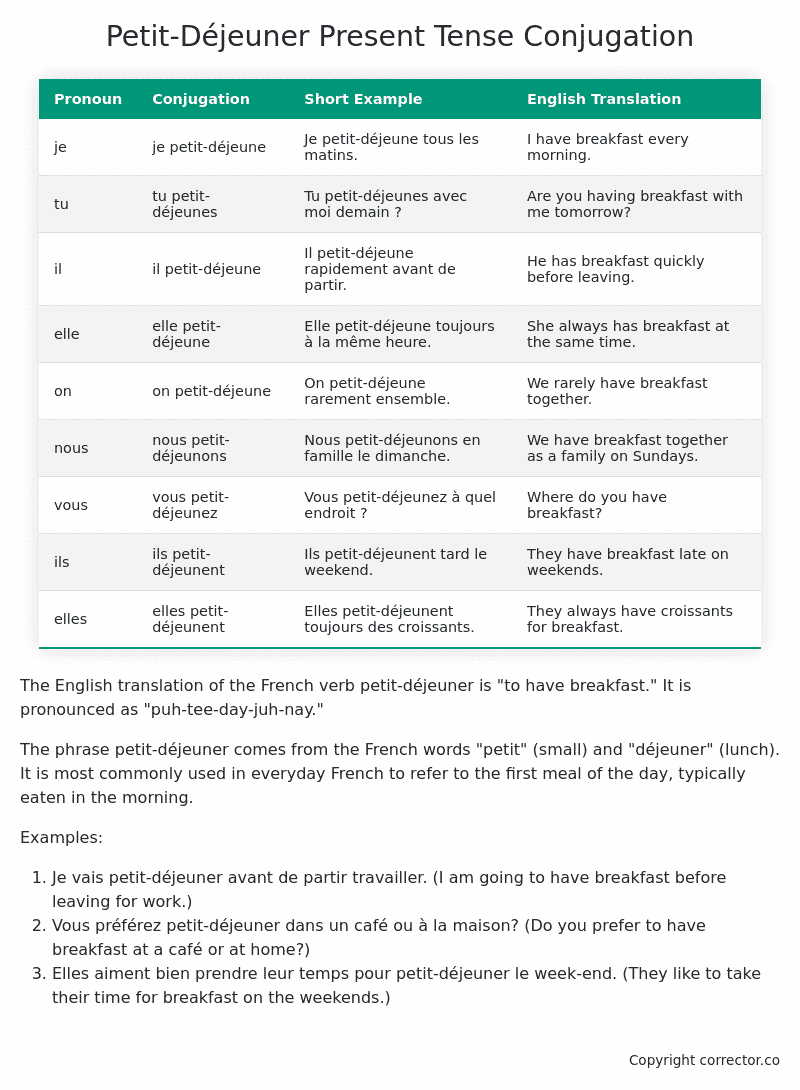Le Present (Present Tense) Conjugation of the French Verb petit-déjeuner
Introduction to the verb petit-déjeuner
The English translation of the French verb petit-déjeuner is “to have breakfast.” It is pronounced as “puh-tee-day-juh-nay.”
The phrase petit-déjeuner comes from the French words “petit” (small) and “déjeuner” (lunch). It is most commonly used in everyday French to refer to the first meal of the day, typically eaten in the morning.
Examples:
- Je vais petit-déjeuner avant de partir travailler. (I am going to have breakfast before leaving for work.)
- Vous préférez petit-déjeuner dans un café ou à la maison? (Do you prefer to have breakfast at a café or at home?)
- Elles aiment bien prendre leur temps pour petit-déjeuner le week-end. (They like to take their time for breakfast on the weekends.)
Petit-Déjeuner – About the French Present Tense
To take a deep dive into all the French tenses then see our article on Mastering French Tense Conjugation.
Common Everyday Usage Patterns For Le Present
Interactions with Other Tenses
Table of the Present Tense Conjugation of petit-déjeuner
| Pronoun | Conjugation | Short Example | English Translation |
|---|---|---|---|
| je | je petit-déjeune | Je petit-déjeune tous les matins. | I have breakfast every morning. |
| tu | tu petit-déjeunes | Tu petit-déjeunes avec moi demain ? | Are you having breakfast with me tomorrow? |
| il | il petit-déjeune | Il petit-déjeune rapidement avant de partir. | He has breakfast quickly before leaving. |
| elle | elle petit-déjeune | Elle petit-déjeune toujours à la même heure. | She always has breakfast at the same time. |
| on | on petit-déjeune | On petit-déjeune rarement ensemble. | We rarely have breakfast together. |
| nous | nous petit-déjeunons | Nous petit-déjeunons en famille le dimanche. | We have breakfast together as a family on Sundays. |
| vous | vous petit-déjeunez | Vous petit-déjeunez à quel endroit ? | Where do you have breakfast? |
| ils | ils petit-déjeunent | Ils petit-déjeunent tard le weekend. | They have breakfast late on weekends. |
| elles | elles petit-déjeunent | Elles petit-déjeunent toujours des croissants. | They always have croissants for breakfast. |
Other Conjugations for Petit-Déjeuner.
Le Present (Present Tense) Conjugation of the French Verb petit-déjeuner (this article)
Imparfait (Imperfect) Tense Conjugation of the French Verb petit-déjeuner
Passé Simple (Simple Past) Tense Conjugation of the French Verb petit-déjeuner
Passé Composé (Present Perfect) Tense Conjugation of the French Verb petit-déjeuner
Futur Simple (Simple Future) Tense Conjugation of the French Verb petit-déjeuner
Futur Proche (Near Future) Tense Conjugation of the French Verb petit-déjeuner
Plus-que-parfait (Pluperfect) Tense Conjugation of the French Verb petit-déjeuner
Passé Antérieur (Past Anterior) Tense Conjugation of the French Verb petit-déjeuner
Futur Antérieur (Future Anterior) Tense Conjugation of the French Verb petit-déjeuner
Subjonctif Présent (Subjunctive Present) Tense Conjugation of the French Verb petit-déjeuner
Subjonctif Passé (Subjunctive Past) Tense Conjugation of the French Verb petit-déjeuner
Subjonctif Imparfait (Subjunctive Imperfect) Tense Conjugation of the French Verb petit-déjeuner
Conditionnel Présent (Conditional Present) Tense Conjugation of the French Verb petit-déjeuner
Conditionnel Passé (Conditional Past) Tense Conjugation of the French Verb petit-déjeuner
L’impératif Présent (Imperative Present) Tense Conjugation of the French Verb petit-déjeuner
L’infinitif Présent (Infinitive Present) Tense Conjugation of the French Verb petit-déjeuner
Struggling with French verbs or the language in general? Why not use our free French Grammar Checker – no registration required!
Get a FREE Download Study Sheet of this Conjugation 🔥
Simply right click the image below, click “save image” and get your free reference for the petit-déjeuner Present Tense tense conjugation!

I hope you enjoyed this article on the verb petit-déjeuner. Still in a learning mood? Check out another TOTALLY random French verb present conjugation!


